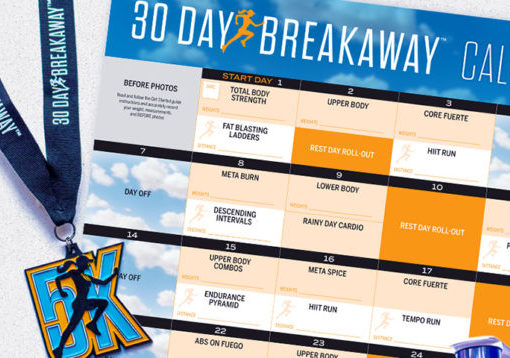I’ve been having heart rate issues for years, dating back to at least 20 years ago when I first moved to Albuquerque from New Jersey. It has always been with my running heart rate until recently. Some of those issues have subsided but have been replaced with an irregular heart beat and a fairly common Mobitz 1 block. I want to share the article below with you from the Polar Blog since I have worn Polar heart rate monitors exclusively for over 32 years. I am currently using the Polar Vantage M and it is set to monitor heart rate continuously. You can learn more about the Vantage M here.
Originally published Apr 12, 2018 9:15:55 AM, updated February 4, 2019
It’s Track Tuesday, and you’re up with the sun to meet your crew for an intense 12x400m workout. After a proper warm-up, you take off, crushing the first interval. Then the second. Then the third.
By your fifth 400, you’re struggling to make it through the 200m recovery jog. By the sixth 400, your pace has slowed, but your heart rate has skyrocketed. And by the time you – somehow – get to your final loop of the track, your heart rate officially feels too high, your heart is beating out of your chest, and you decide to walk in the cool-down.
Going out too eager, too hard, and too fast is common. But sometimes, the problem isn’t just the pace, and it’s definitely not your legs – it’s your heart rate. And while what goes up must eventually come down, there are warning signs that you’re working too hard – and that’s not always a good thing.
Know What Different Running Heart Rate Zones Feel Like and Stay Out of the Danger Zone
Just because your heart is pumping and you’re feeling fatigued doesn’t mean you’re working out in the danger zone. The key is understanding your running heart rate and those zones – the aerobic system, the lactic threshold system, and the anaerobic system – and what they feel like so you know when you’ve moved past them.
Generally during a run, you’re in one of those three zones. If you’re working with a heart rate monitor, it’s easy to see what zone you’re working within. But if you don’t have a monitor (yet!), there are other physical markers to estimate which system you’re training, such as “the talking testâ€.
â€If you can speak in full sentences, you’re likely in the aerobic zone. If you can say a few words at a time, you’re probably in the lactic threshold zone. And if you can barely get out one or two words, you’ve probably found yourself in the anaerobic zone.“ But if you start to hyperventilate or get dizzy, your heart rate is probably too high, and you should stop and rest,†says Jason Lakritz, PT, DPT, physical therapist at Finish Line Physical Therapy in New York City and founder of Profunctional Running
What Happens When Your Heart Rate Gets Too High for Too Long?
Take a marathon training schedule, for example. “A marathon training plan has a lot of easy, aerobic runs, because the act of running a marathon is primarily aerobic,†Lakritz says.
“Your body has to become really efficient at burning fat for energy so it can last a long time.†Over time, the pace at which you can do this will improve – you can run faster at the same heart rate as you get in shape. But if you consistently run your easy runs at 75% of your max heart rate, you won’t train this system of your body.
“You’ll probably get better at shorter distance races because you’re training the lactic threshold system, which helps you run faster for a shorter period of time,†Lakritz explains. “But by always running at this pace, your body won’t be able to recover enough to properly train the lactic threshold system, either.â€
Your body will already be tired, so your heart rate will actually be higher at slower running paces. According to your heart rate, you might be within your lactic threshold range at a 6-minute mile pace if you’re tired from running too fast the previous day. But if you were fully recovered from the previous day, you might be able to run a 5:45 pace at the same heart rate range.
“Eventually, running at a heart rate that’s too high for the purpose of your training will lead to a plateau in race times, burnout, or injury,†Lakritz says.
While heart rate training is a great tool to ensure you’re training in the appropriate zones, the numbers don’t lie. “As you become more experienced, it’s also good to use internal cues to learn what system you’re using,†Lakritz says. “Consider the talking test. This is just a way to measure how hard you’re breathing. I like going by the data at the beginning of a training cycle to make sure I feel the right pace, but during a race, you really want to feel the right pace and not be too attached to those numbers.â€
What to Do When Your Heart Rate Gets Too High
You’re out for a run and it’s going great. You’re on mile four of a five-mile tempo run, and you’re in that sweet spot where your perfect pace feels comfortably hard. But soon, your heart rate begins to climb. Within a few minutes, comfortably hard feels uncomfortable.
If you’re not paying attention, the feeling of dizziness, or feeling close to hyperventilating, may creep up on you. That means your heart rate has been too high for too long and you need to get it down to be able to continue running. Here’s how to lower your heart rate while running, and what to do when you find yourself in a scary situation on the run.
IF YOU’RE OUT FOR A TRAINING RUN…
Sure, you may get competitive with your training buddies or internet friends on Strava, but ultimately, workouts aren’t made to be won or lost. That’s what race day is for.
So, if you find yourself running with an elevated heart rate for too long, you should absolutely slow down, ease up, walk for a bit, or take a few moments to regain your composure and your breath.
“From a health perspective, in the short term, I’m not too concerned that an athlete will work so hard that there are any dangers to an overly elevated heart rate,†says exercise physiologist and City Coach Multisport owner Jonathan Cane. “But long, high-intensity work may increase that risk.â€
While it may seem counterintuitive, working harder isn’t always better.
“I’m a big believer in working hard on hard days, but also that the counterpoint of really easy days is important,†says Cane. “Ideally, each workout should have a purpose. If it’s a recovery day, by all means, take it easy. If it’s a day where your goal is to increase your threshold, then push your heart rate to that area. And if it’s a VO2 max kind of day, by all means work really hard and don’t be deterred by a high heart rate.â€
IF YOU’RE IN THE MIDDLE OF A RACE…
One of the keys to performing well is getting the most out of your physical ability.
“It might have felt like it came out of nowhere, but in reality, it didn’t.â€
“Far too often I’ve had a runner tell me he or she was racing along just fine and then boom, out of nowhere they needed to slow way down,†Cane says. “It might have felt like it came out of nowhere, but in reality, it didn’t.â€
Oftentimes, the difference between a successful race and a disappointing one comes down to having the awareness to make minor adjustments sooner rather than major adjustments later.
“In some cases, an athlete can recognize that their effort is too hard and can back off accordingly,†says Cane. “But oftentimes, by the time your brain has caught on, your body has been writing checks it can’t cash for quite a while already.†Determining an appropriate heart rate for the event at hand is a great way to help determine the appropriate intensity. “If you see your heart rate drifting past where it should be, you can – and should – adjust,†Cane says.
“Ideally,†Cane adds, “that adjustment is a subtle one, and the combination of tuning into the body’s cues and the data from your heart rate monitor can help you know when to back off a little. That scenario is preferable to having to slow to a walk.â€
“Of course, in a race setting, at a certain point you should just race and react and not worry about going too fast, but in the earlier stages, it’s important not to let your ambition get the best of you.â€




